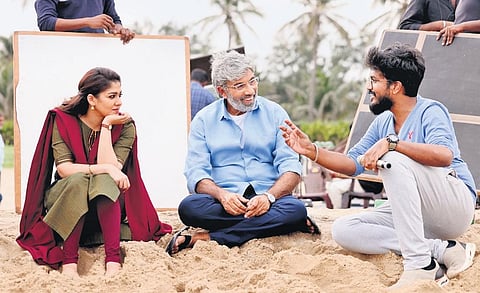

Food is probably one of the very few things uniting every living organism. However, the politics surrounding food has always ended up dividing people for their choices and preferences. Debut filmmaker Nilesh Krishnaa, who has made Annapoorani, a film based on the life of a female chef, starring Nayanthara, states that his film is aimed at delivering a message on inclusivity. “What better element than food can be used to unite people for a greater purpose?” he says brimming with confidence.
Excerpts:
Did you have a specific reason to bring in the orthodox practices and specific communities like Brahmins and Muslims, considering it could draw the ire of the respective communities?
This film aims at delivering a message of inclusivity. Farhaan (Jai) needed to be a Muslim because we wanted to show the food culture of that community. Similarly, we wanted Annapoorani to belong to an orthodox Brahmin family that serves at the temple ‘Madapalli’ (kitchen), so we could show the different ways in which food is interpreted. We do not intend to offend anyone through mockery, or by proving them wrong. We were cautious to avoid preaching or saying that a particular culture was wrong.
Will Annapoorani hurt the belief of a certain section of the audience?
I am confident my film won’t hurt the sentiments of people. It has cleared censorship formalities with a clean U certificate, and we did not receive any visual cuts. If there was something disturbing communal harmony in the film, the censor board would not have allowed it. I knew that I was handling a very sensitive topic so I have done the necessary work to ensure that I got the representations right.
It is a rather unconventional choice to set the lead character in an Iyenger household and name her Annapoorani, a manifestation of the Goddess Parvathi, the wife of Shiva Naming Nayanthara’s character Annapoorani, despite her belonging to an Iyengar family, was an intentional call. Be it the name or the Ganesha pendant she wears, all these elements are placed to suggest that her character is inclusive and that she’s the odd one from an orthodox family. She has no boundaries and her religion is food. There’s a play around why she is named Annapoorani, and that will make sense when you watch the film.
Can you elaborate on the research that went behind handling the portrayal of the two religions and the culinary world?
Our research went on for almost 1.5 years. We started with basics like observing the architecture of houses in Srirangam, especially in the Agraharam areas. We believe that these things contribute a lot to the story’s authenticity.
We also researched in depth about the Madapalli cooks, starting from the fashion in which they wear their towels and dhoti to their signature practices in cooking. Since I grew up surrounded by this culture, I had an upper hand in understanding things. We also had people practising Islam on the sets to guide us with aspects related to their religion. Similarly, we had a chef on the set throughout the film’s shoot and a food stylist called RK to ensure our presentation was nothing short of the industry standards. Chef Dhamu was our head consultant and Chef Kaushik was a part of the cast.
In India, women are expected to cook at home, while the commercial culinary world is dominated by men. Does Annapoorani address this?
The film at its core addresses how the industry is male-dominated and the challenges a woman undergoes to succeed in it. Be it the catering college portions or the competition rounds, Annapoorani is the only female chef you see onscreen. We also have an important scene that talks about how women are always burdened with responsibilities in the kitchen.
While Annapoorani is your debut, it is Nayanthara’s milestone 75th film. Did you have the pressure to add heroic moments and commercial elements?
Nayanthara is someone who has a loyal fanbase. I was very cautious that I should say only the right things through her without offending anyone in any way. More than the message, I wanted to present Nayanthara as Annapoorani. We didn’t want to go overboard with the commercial elements and the ones we have included in the narrative are within the limits of the character. Even the ‘Superstar’ dialogue she says in the trailer, is kept because the dialogue is the core of the film and when Nayanthara delivers it, it is sure to reach a lot of people.